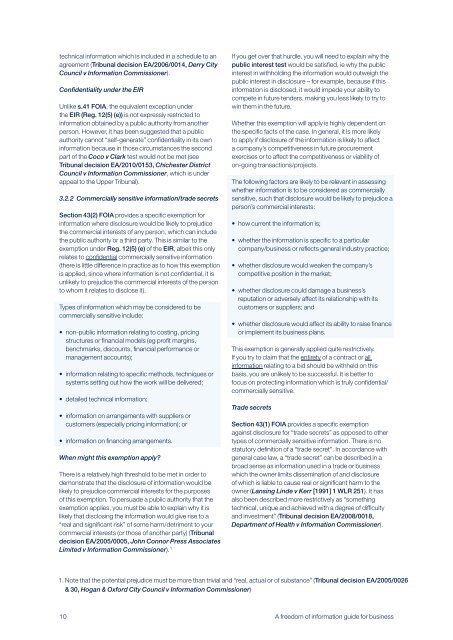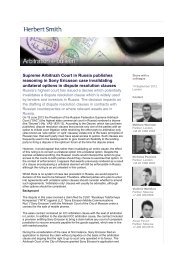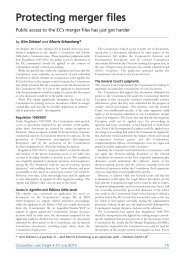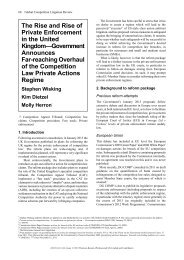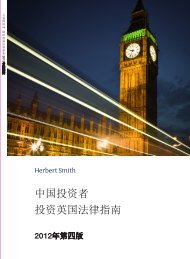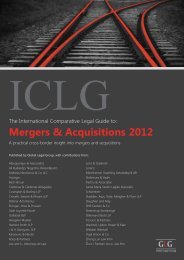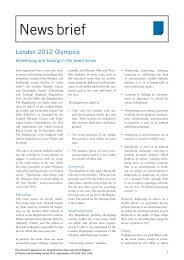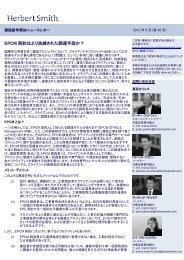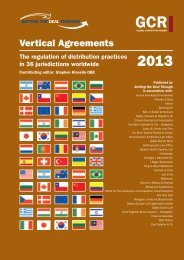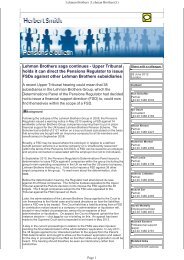Freedom of information: A guide for business - Herbert Smith Freehills
Freedom of information: A guide for business - Herbert Smith Freehills
Freedom of information: A guide for business - Herbert Smith Freehills
Create successful ePaper yourself
Turn your PDF publications into a flip-book with our unique Google optimized e-Paper software.
technical <strong>in<strong>for</strong>mation</strong> which is included in a schedule to an<br />
agreement (Tribunal decision EA/2006/0014, Derry City<br />
Council v In<strong>for</strong>mation Commissioner).<br />
Confidentiality under the EIR<br />
Unlike s.41 FOIA, the equivalent exception under<br />
the EIR (Reg. 12(5) (e)) is not expressly restricted to<br />
<strong>in<strong>for</strong>mation</strong> obtained by a public authority from another<br />
person. However, it has been suggested that a public<br />
authority cannot “self-generate” confidentiality in its own<br />
<strong>in<strong>for</strong>mation</strong> because in those circumstances the second<br />
part <strong>of</strong> the Coco v Clark test would not be met (see<br />
Tribunal decision EA/2010/0153, Chichester District<br />
Council v In<strong>for</strong>mation Commissioner, which is under<br />
appeal to the Upper Tribunal).<br />
3.2.2 Commercially sensitive <strong>in<strong>for</strong>mation</strong>/trade secrets<br />
Section 43(2) FOIA provides a specific exemption <strong>for</strong><br />
<strong>in<strong>for</strong>mation</strong> where disclosure would be likely to prejudice<br />
the commercial interests <strong>of</strong> any person, which can include<br />
the public authority or a third party. This is similar to the<br />
exemption under Reg. 12(5) (e) <strong>of</strong> the EIR, albeit this only<br />
relates to confidential commercially sensitive <strong>in<strong>for</strong>mation</strong><br />
(there is little difference in practice as to how this exemption<br />
is applied, since where <strong>in<strong>for</strong>mation</strong> is not confidential, it is<br />
unlikely to prejudice the commercial interests <strong>of</strong> the person<br />
to whom it relates to disclose it).<br />
Types <strong>of</strong> <strong>in<strong>for</strong>mation</strong> which may be considered to be<br />
commercially sensitive include:<br />
• non-public <strong>in<strong>for</strong>mation</strong> relating to costing, pricing<br />
structures or financial models (eg pr<strong>of</strong>it margins,<br />
benchmarks, discounts, financial per<strong>for</strong>mance or<br />
management accounts);<br />
• <strong>in<strong>for</strong>mation</strong> relating to specific methods, techniques or<br />
systems setting out how the work will be delivered;<br />
• detailed technical <strong>in<strong>for</strong>mation</strong>;<br />
• <strong>in<strong>for</strong>mation</strong> on arrangements with suppliers or<br />
customers (especially pricing <strong>in<strong>for</strong>mation</strong>); or<br />
• <strong>in<strong>for</strong>mation</strong> on financing arrangements.<br />
When might this exemption apply<br />
There is a relatively high threshold to be met in order to<br />
demonstrate that the disclosure <strong>of</strong> <strong>in<strong>for</strong>mation</strong> would be<br />
likely to prejudice commercial interests <strong>for</strong> the purposes<br />
<strong>of</strong> this exemption. To persuade a public authority that the<br />
exemption applies, you must be able to explain why it is<br />
likely that disclosing the <strong>in<strong>for</strong>mation</strong> would give rise to a<br />
“real and significant risk” <strong>of</strong> some harm/detriment to your<br />
commercial interests (or those <strong>of</strong> another party) (Tribunal<br />
decision EA/2005/0005, John Connor Press Associates<br />
Limited v In<strong>for</strong>mation Commissioner). 1<br />
If you get over that hurdle, you will need to explain why the<br />
public interest test would be satisfied, ie why the public<br />
interest in withholding the <strong>in<strong>for</strong>mation</strong> would outweigh the<br />
public interest in disclosure – <strong>for</strong> example, because if this<br />
<strong>in<strong>for</strong>mation</strong> is disclosed, it would impede your ability to<br />
compete in future tenders, making you less likely to try to<br />
win them in the future.<br />
Whether this exemption will apply is highly dependent on<br />
the specific facts <strong>of</strong> the case. In general, it is more likely<br />
to apply if disclosure <strong>of</strong> the <strong>in<strong>for</strong>mation</strong> is likely to affect<br />
a company’s competitiveness in future procurement<br />
exercises or to affect the competitiveness or viability <strong>of</strong><br />
on-going transactions/projects.<br />
The following factors are likely to be relevant in assessing<br />
whether <strong>in<strong>for</strong>mation</strong> is to be considered as commercially<br />
sensitive, such that disclosure would be likely to prejudice a<br />
person’s commercial interests:<br />
• how current the <strong>in<strong>for</strong>mation</strong> is;<br />
• whether the <strong>in<strong>for</strong>mation</strong> is specific to a particular<br />
company/<strong>business</strong> or reflects general industry practice;<br />
• whether disclosure would weaken the company’s<br />
competitive position in the market;<br />
• whether disclosure could damage a <strong>business</strong>’s<br />
reputation or adversely affect its relationship with its<br />
customers or suppliers; and<br />
• whether disclosure would affect its ability to raise finance<br />
or implement its <strong>business</strong> plans.<br />
This exemption is generally applied quite restrictively.<br />
If you try to claim that the entirety <strong>of</strong> a contract or all<br />
<strong>in<strong>for</strong>mation</strong> relating to a bid should be withheld on this<br />
basis, you are unlikely to be successful. It is better to<br />
focus on protecting <strong>in<strong>for</strong>mation</strong> which is truly confidential/<br />
commercially sensitive.<br />
Trade secrets<br />
Section 43(1) FOIA provides a specific exemption<br />
against disclosure <strong>for</strong> “trade secrets” as opposed to other<br />
types <strong>of</strong> commercially sensitive <strong>in<strong>for</strong>mation</strong>. There is no<br />
statutory definition <strong>of</strong> a “trade secret”. In accordance with<br />
general case law, a “trade secret” can be described in a<br />
broad sense as <strong>in<strong>for</strong>mation</strong> used in a trade or <strong>business</strong><br />
which the owner limits dissemination <strong>of</strong> and disclosure<br />
<strong>of</strong> which is liable to cause real or significant harm to the<br />
owner (Lansing Linde v Kerr [1991] 1 WLR 251). It has<br />
also been described more restrictively as “something<br />
technical, unique and achieved with a degree <strong>of</strong> difficulty<br />
and investment” (Tribunal decision EA/2008/0018,<br />
Department <strong>of</strong> Health v In<strong>for</strong>mation Commissioner).<br />
1. Note that the potential prejudice must be more than trivial and “real, actual or <strong>of</strong> substance” (Tribunal decision EA/2005/0026<br />
& 30, Hogan & Ox<strong>for</strong>d City Council v In<strong>for</strong>mation Commissioner)<br />
10 A freedom <strong>of</strong> <strong>in<strong>for</strong>mation</strong> <strong>guide</strong> <strong>for</strong> <strong>business</strong>


